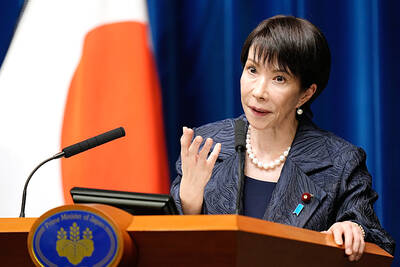A Chinese magazine dedicated to history has been forced to halt the release of an issue that was to chronicle Taiwan’s democratic transformation, a Shanghai-based newspaper reported yesterday.
National History magazine, published by the state-run Chengdu Xianfeng Culture Media in Sichuan Province, had compiled a series of articles authored by Taiwanese writers for a special edition for next month titled “Taiwan’s Foot,” the Oriental Daily News reported.
Citing Chengdu Xianfeng deputy editor-in-chief Da Hai (達海), the newspaper said the magazine, which is circulated around China, stopped the release of next month’s edition “due to an inappropriate selection of topics.”
Da said there would be a combined February-March edition, which “will be delivered to subscribers on time,” the report said.
He added that the combined edition “has been sent to news and publication management authorities to serve as a record based on the relevant regulations.”
The cancelation is the latest in a number of recent attempts at censorship by Chinese authorities eager to maintain tight control over the media.
Journalists at the Southern Weekly went on strike earlier this month after a Chinese Communist Party propaganda chief dramatically altered a front page editorial calling for constitutional rights.
Chinese Ministry of Foreign Affairs spokeswoman Hua Chunying (華春瑩) said at the time that “there’s no so-called press censorship system in China.”
The Oriental Daily quoted Sun Zhan (孫展), National History’s executive editor, as saying that his team had worked on the special edition for six months, inviting 14 Taiwanese writers, including Yang Tu (楊度), Chang Tieh-chih (張鐵志) and Chu Tien-i (朱天衣), to write on Taiwan’s political transformation over the past 100 years.
Some of the writers witnessed the transformation and a lot of the content would have been revealed publicly for the first time, Sun said.
National History magazine, founded in September 2007, is touted as China’s first news journal focusing on historical events. It has a circulation of more than 100,000 copies a month.

The Ministry of Foreign Affairs (MOFA) yesterday voiced dissatisfaction with the Comprehensive and Progressive Agreement for Trans- Pacific Partnership (CPTPP), whose latest meeting, concluded earlier the same day, appeared not to address the country’s application. In a statement, MOFA said the CPTPP commission had "once again failed to fairly process Taiwan’s application," attributing the inaction to the bloc’s "succumbing to political pressure," without elaborating. Taiwan submitted its CPTPP application under the name "Separate Customs Territory of Taiwan, Penghu, Kinmen and Matsu" on Sept. 22, 2021 -- less than a week after China

THE GOOD WORD: More than 100 colleges on both sides of the Pacific will work together to bring students to Taiwan so they can learn Mandarin where it is spoken A total of 102 universities from Taiwan and the US are collaborating in a push to promote Taiwan as the first-choice place to learn Mandarin, with seven Mandarin learning centers stood up in the US to train and support teachers, the Foundation for International Cooperation in Higher Education of Taiwan (FICHET) said. At the annual convention of the American Council on the Teaching of Foreign Languages held over the weekend in New Orleans, Louisiana, a Taiwan Pavilion was jointly run by 17 representative teams from the FICHET, the Overseas Community Affairs Council, the Steering Committee for the Test of Proficiency-Huayu, the

A home-style restaurant opened by a Taiwanese woman in Quezon City in Metro Manila has been featured in the first-ever Michelin Guide honoring exceptional restaurants in the Philippines. The restaurant, Fong Wei Wu (豐味屋), was one of 74 eateries to receive a “Michelin Selected” honor in the guide, while one restaurant received two Michelin stars, eight received one star and 25 were awarded a “Bib Gourmand.” The guide, which was limited to restaurants in Metro Manila and Cebu, was published on Oct. 30. In an interview, Feng Wei Wu’s owner and chef, Linda, said that as a restaurateur in her 60s, receiving an

MORE RETALIATION: China would adopt a long-term pressure strategy to prevent other countries or future prime ministers following in Sanae Takaichi’s steps, an academic said Taiwan should maintain communications with Japan, as Japanese Prime Minister Sanae Takaichi is to lead a revision of security documents, Taiwanese academics said yesterday. Tensions have risen between Japan and China over remarks by Takaichi earlier this month that the use of force against Taiwan would constitute a “survival-threatening situation” for Japan. Prospect Foundation president Lai I-chung (賴怡忠) yesterday said Takaichi’s stance regarding Taiwan is the same as past Japanese prime ministers, but her position is clearer than that of her predecessors Fumio Kishida and Shigeru Ishiba. Although Japan views a “Taiwan contingency” as a “survival-threatening situation,” which would allow its military to